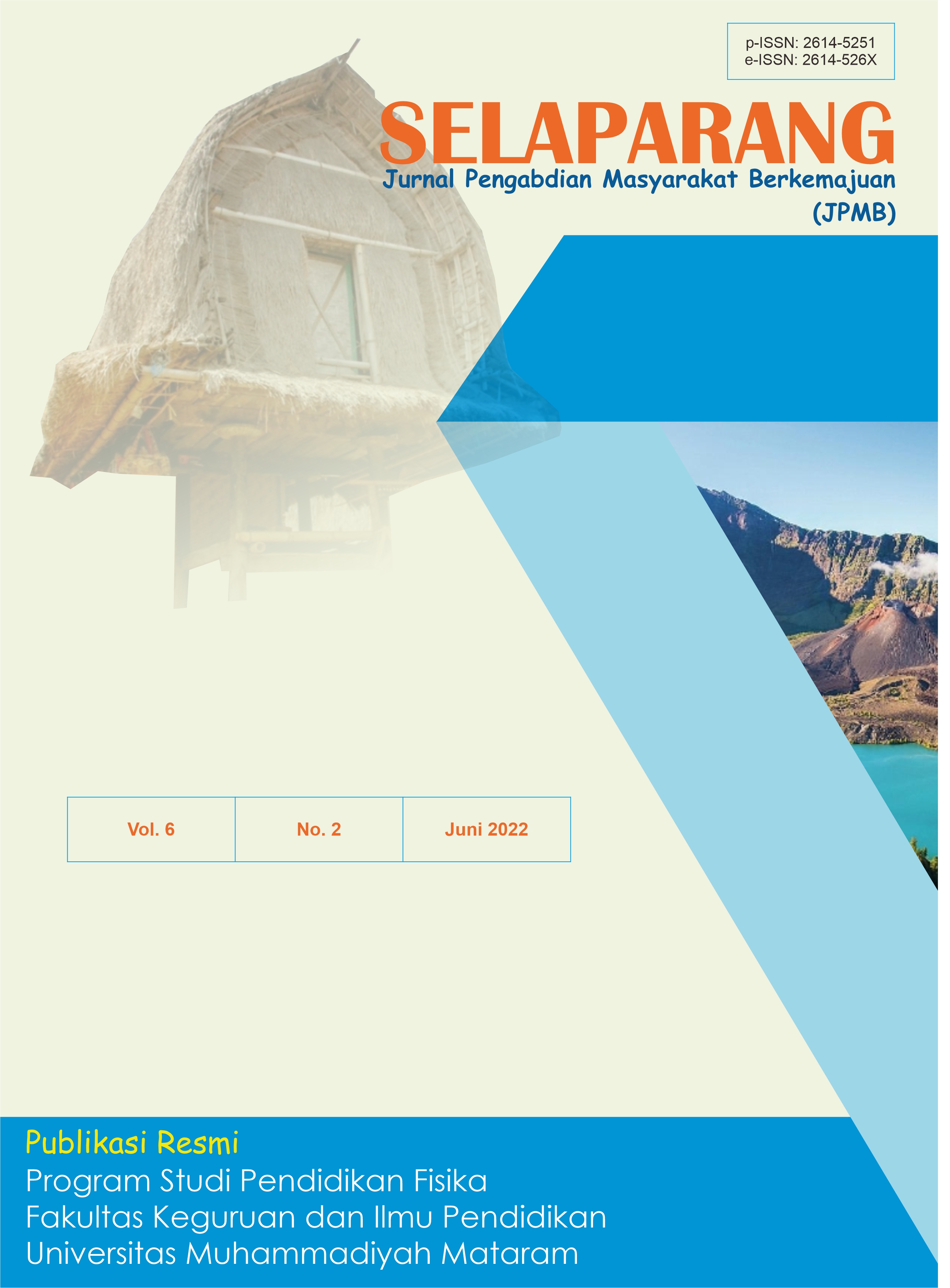PEMBERDAYAAN OB KAMPUS MELALUI BLENDED WORSHOP PENGOLAHAN SAMPAH ORGANIK MENJADI KOMPOS
DOI:
https://doi.org/10.31764/jpmb.v6i2.7055Keywords:
empowerment, blended workshop, organic waste, compostAbstract
ABSTRAK
Kampus sebagai tempat lahirnya para intelektual muda, diharapkan dapat memberikan solusi atas permasalahan yang terjadi dewasa ini, khususnya masalah sampah. Aktivitas yang dilakukan oleh civitas akademika di sekitar kampus membuat jumlah sampah meningkat sepanjang tahun, akan tetapi kurang diimbangi dengan pengolahan sampah di sekitar kampus. Terlebih lagi, para tenaga kebersihan kampus (OB) kurang dibekali tentang cara pengolahan sampah, misalnya sampah organik. Tujuan pengabdian ini adalah memberikan pelatihan kepada para OB melalui workshop pengolahan sampah organik menjadi kompos di wilayah sekitar kampus. Metode yang digunakan adalah POA (Planning of Action), serta metode survey untuk mengevaluasi keberhasilan kegiatan. Pelaksanaan kegiatan secara blended mengingat PPKM (Pemberlakuan Pembatasan Kegiatan Masyarakat). Worshop online dilakukan saat paparan materi teori oleh narasumber, dan offline saat praktek dengan jumlah peserta terbatas. Hasil pengabdian ditunjukkan dengan respon antusiasme tinggi dari partisipan yang hadir secara langsung (offline) maupun tak langsung (online). Sebagian besar partisipan menginginkan ada rencana tindak lanjut dari kegiatan ini.
Â
Kata kunci: pemberdayaan; blended workshop; sampah organik; kompos
Â
ABSTRACT
Campus as the birthplace of young intellectuals, is expected to be able to provide solutions to the problems that occur today, especially the waste problem. Activities carried out by the academic community around the campus make the amount of waste increase throughout the year, but it is not balanced with waste processing around the campus. What's more, the campus cleaning staff (CS) are not equipped with how to process waste, such as organic waste. The purpose of this service is to provide training to OBs through workshops on processing organic waste into compost in the area around campus. The method used is POA (Planning of Action), as well as a survey method to evaluate the success of the activity. The implementation of the activities is blended considering the PPKM (Enforcement of Restrictions on Community Activities). Online workshops are carried out during exposure to theoretical material by resource persons, and offline during practice with a limited number of participants. The results of the service are shown by high enthusiasm responses from participants who attend directly (offline) and indirectly (online). Most of the participants wanted a follow-up plan for this activity
Â
Keywords: empowerment; blended workshop; organic waste; compost
References
Dharmawan, A., Prasetya, B., & Prijono, S. (2012). Studi Potensi Pengolahan Sampah di Kampus Universitas Brawijaya Secara Biologis Dengan Menggunakan Makrofauna (bekicot dan cacing tanah). Tesis. Universitas Brawijaya. Malang.
Jasminarni, J., Ardiyaningsih, P. L., Evita, E., & Trias, N. (2020). PPM Himae Dalam Memproduksi Trichokompos Berbasis Sampah Organik Kampus. Karya Abdi Masyarakat Universitas Jambi, 4(1), 92–97.
Saibah, B. R. A. M., Marlina, W. A., Faisal, R. F., Agestayani, A., Erizal, E., Susiana, S., Srivani, M., Ahmad, F. A., & Jauharry, J. (2018). Pengelolaan dan pengolahan sampah pada masyarakat sekitar kampus 2 Unand, payakumbuh. Jurnal Hilirisasi IPTEKS, 1(4. b), 274–284.
Sangga Saputra, N. A., & Mulasari, S. A. (2017). Pengetahuan, sikap, dan perilaku pengelolaan sampah pada karyawan di kampus. Jurnal Kesehatan Masyarakat, 11(1).
Saputra, S., & Mulasari, S. A. (2017). Pengetahuan, sikap, dan perilaku pengelolaan sampah pada karyawan di kampus. Jurnal Kesehatan Masyarakat, 11(1), 22-27.
Yuliandari, P., Suroso, E., & Anungputri, P. S. (2019). Studi Timbulan Dan Komposisi Sampah Di Kampus Universitas Lampung. Journal of Tropical Upland Resources (J. Trop. Upland Res.), 1(1), 121–128.
Downloads
Published
Issue
Section
License
The copyright of the received article shall be assigned to the journal as the publisher of the journal. The intended copyright includes the right to publish the article in various forms (including reprints). The journal maintains the publishing rights to the published articles.

Selaparang : Jurnal Pengabdian Masyarakat Berkemajuan is licensed under a Creative Commons Attribution-ShareAlike 4.0 International License.

